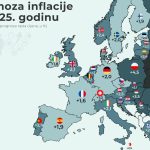They will hold bilateral talks and participate in forums.
The annual security conference will take place in Munich, Germany, from Friday to Sunday. It will bring together the main actors of international security at the time of the uncertain future of transatlantic relations and the crisis of global liberal order after the inauguration of new US president Donald Trump, reports Index.hr on February 16, 2017.
Some of the participants will be German Chancellor Angela Merkel, US Vice President Mike Pence, US Secretary of Defence James Mattis, Secretary General of the UN Antonio Guterres, and NATO Secretary General Jens Stoltenberg.
Croatian President Kolinda Grabar-Kitarović and Foreign Minister Davor Ivo Stier will participate in this key annual gathering which has served since 1963 as an independent forum for the promotion of peaceful conflict resolution, international cooperation and dialogue.
The conference will address the future of NATO and transatlantic relations after the election of Donald Trump, European security and defence cooperation, the crisis in Ukraine and relations with Russia, the war in Syria and the security situation in the Asia-Pacific region. Participants will also discuss terrorism and cyber warfare as major threats to global security.
“We are faced with international security environment which has not been as vulnerable since the Second World War”, said conference chairman Wolfgang Ischlinger. “The liberal order that many of us take for granted is exposed to growing threats from inside and outside. It is therefore important to find ways to defend and strengthen the core values of the West and institutions of the international legal order”, he noted.
The conference in Munich will also be the first opportunity for representatives of the Trump administration to address an international forum and present their foreign policy and defence strategy. US Defence Secretary James Mattis said on Wednesday that NATO was crucial for ties between America and Europe, but he warned member states that they must spend more on defence.
In 2014, member states decided to increase budget allocations for defence to two percent of GDP in the next ten years, but that is currently met by only five of 28 member states. After six years of consecutive decline, the allocation for defence in the Croatian budget for 2017 has been increased by nine percent and should reach 1.23 percent of GDP.
President Kolinda Grabar-Kitarović will hold a series of bilateral meetings with presidents of Azerbaijan, Afghanistan, Finland, Bulgaria, Poland, Latvia, Lithuania, Estonia, Germany, with Bavarian Prime Minister, and with Russian Foreign Minister.
On Thursday, she will participate in the forum on the future of Euro-Atlantic security, speaking about the main obstacles for the successful integration of Southeast Europe into the European Union and NATO.
Fifteen years after the last war in the Balkans, the region has turned from a war zone into an area of cooperation and integration in European and transatlantic structures. Inviting Montenegro to become the 29th member, NATO has confirmed its commitment to a policy of open doors. However, tensions in the region have lately been growing, especially in Kosovo and Bosnia and Herzegovina.







